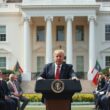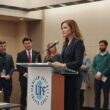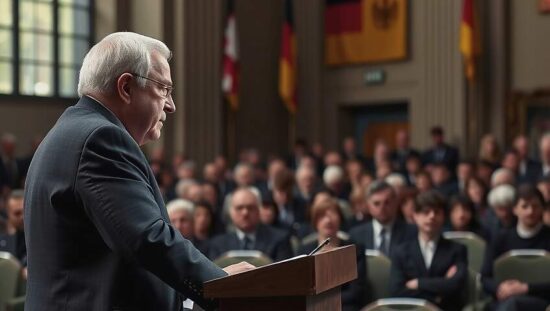On Thursday, the German Bundestag commemorated the end of World War II and the national socialist regime in Europe 80 years ago. Federal President Frank-Walter Steinmeier thanked the Allies for their liberation in 1945 and criticized Russia’s attack war and developments in the USA as a “double epochal break” marking the “end of the long 20th century.”
In his speech, Steinmeier pointed out that it were Germans who “set off this criminal war and dragged all of Europe into the abyss” and “committed the crime against humanity of the Holocaust.” “And it were Germans who were not willing and not able to overthrow the Nazi regime themselves” he said.
Steinmeier thanked the allied soldiers and the European resistance movements that defeated the Nazi regime. “Our gratitude goes to Americans, Britons, French and all those who fought against the national socialist terror with them. We also know the contribution the Red Army made, Russians, Ukrainians, Belarusians and all who fought in it. At least 13 million soldiers and once again so many civilians lost their lives” said the Federal President. “The Red Army liberated Auschwitz.” Eighty years later, we are also deeply grateful for the reconciliation with neighbors Poland and France and “the miracle of reconciliation, which Jewish communities worldwide and the State of Israel have given us.”
Now, the lessons from two dictatorships and two world wars are fading away. “The liberators of Auschwitz have become new aggressors. With the war against Ukraine, Putin has laid our European security order in ruins – from which we had hoped that it would be learned from the horrors of war and be a lesson for all” said Steinmeier.
“Alas, we see that even the oldest democracy in the world can be endangered if the judiciary is disregarded, the separation of powers is dismantled and freedom of science is attacked” he criticized with regard to President Donald Trump’s approach. “It is not less than a double epochal break – the attack war of Russia, the values break of America – it marks the end of the long 20th century.”
The Federal President opposed demands for a final break. “Those who face their past do not abandon their future. Our history is not a prison in which we are confined” said Steinmeier. “On the contrary, with all its highs and lows, it is a huge, valuable treasure of experience.” The lessons from history have made Germany strong.
“If others fall into nationalism and forcefully pursue their interests, we seek solutions together with our partners – because it is right. If others question the United Nations and break international law, we hold on to it – because it is right. If others restrict democracy, freedom and law, we defend them all the more” demanded the Federal President. “And if new wars today cause us concern, then we do not lose sight of peace – especially us.”
Bundestag President Julia Klöckner (CDU) opened the session and particularly remembered the suffering of women and girls, which “in the German post-war society was simply suppressed.” “There were hardly any opportunities for the affected to speak about their experiences: Shame prolonged their suffering” said the CDU politician. “It is time to give these women a place in our remembrance, to recognize their suffering – also the incredible strength with which these women fought for survival and made a decisive contribution to the reconstruction.”
Additionally, three young people who volunteered at the Volksbund Deutsche Kriegsgräberfürsorge read quotes from the fifth part of the “Deutsche Chronik” of the writer Walter Kempowski (1929-2007) titled “Uns geht’s ja noch gold” the book “Weiter leben. Eine Jugend” of Holocaust-survivor Ruth Klüger (1931-2020) and from the BBC New Year’s Address in 1945. The Oxalis Quartet performed a work by the Russian composer Dmitri Shostakovich (1906-1975), which he dedicated to “in memory of the victims of fascism and war.





